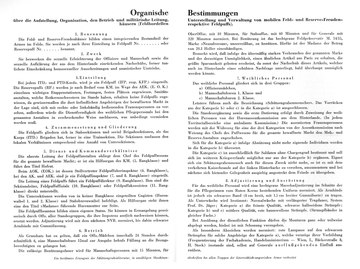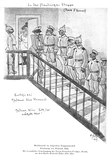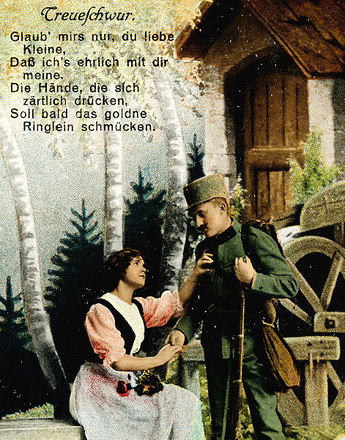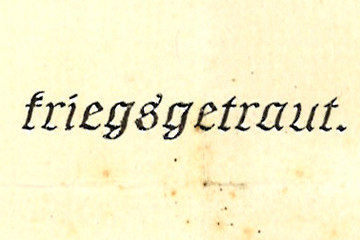The military in the belligerent countries used different strategies to prevent the spread of venereal diseases. Not everyone was convinced of the effectiveness of moral instruction and offered regulated prostitution as an alternative.
During the First World War there was an increase in covert or unofficial prostitution. Women who only occasionally prostituted themselves and did not do it for a living were known in Austria and Germany as covert prostitutes. France and Great Britain also had “jeunes filles” and “amateur girls”. The definition of prostitution was fairly broad, however, and soon all forms of extramarital sexual relations by women were being decried as “harlotry”.
The regulation of prostitution in Austria was the responsibility of the “Sittenpolizei”, which handled both registration and health checks. To combat the spread of venereal diseases, all registered prostitutes were obliged to undergo regular compulsory examinations. Covert prostitutes were not registered and were hence not subject to medical check-ups. The police nevertheless endeavoured to identify women suspected of prostitution and to have them registered. Because of the growing number of soldiers suffering from venereal diseases, the military authorities called for stricter control of both registered and covert prostitutes.
Doctors and health officials were doubtful about the effectiveness of this kind of control and considered covert prostitution to be particularly dangerous. The Austrian military thus attempted to order regular examinations for women working in the hotel and restaurant business, whom they saw as a possible source of the spread of venereal disease. The massive public protest prevented this measure from being implemented.
Commercial prostitution was widespread at the front and behind the lines. There were separate brothels for officers and other ranks, which were controlled by army doctors and in some cases even operated by the military itself. Control cards were issued to the prostitutes working in these brothels in which the regular health examinations were listed. A prostitute found to have a venereal disease was dismissed immediately from the brothel or sent for treatment in a specially established women’s hospital.
In his autobiography, the German soldier Erwin Blumenfeld, who was appointed bookkeeper for the field brothel in Valenciennes, France, in 1917, provided a detailed description of a German brothel behind the lines:
“Now I was called upon to do my duty for the fatherland as a brothel bookkeeper. […] Besides myself, there were 18 women in the establishment, six exclusively for the officers, from wagoner upwards. While the soldiers’ women had to satisfy at least 30 men a day, the officers’ ladies were only required to service 25. […] In my logbook I had to enter the serial number of each visit along with the name and number of the woman, the room number and the start and end of the visit. A visit cost 4 marks […}: 1 mark for the woman, 1 mark for the brothel keeper […] and 2 marks for the Red Cross, which was responsible for the moral health of this military undertaking.”
Translation: Nick Somers
Blumenfeld, Erwin: Durch tausendjährige Zeit. Erinnerungen, Berlin 1988
Daniel, Ute: Arbeiterfrauen in der Kriegsgesellschaft. Beruf, Familie und Politik im Ersten Weltkrieg, Göttingen 1989
Daniel, Ute: Frauen, in: Hirschfeld, Gerhard/Krumeich, Gerd/Renz, Irina (Hrsg.): Enzyklopädie Erster Weltkrieg, Paderborn/München/Wien/Zürich 2009, 116-134
Eder, Franz X.: Kultur der Begierde. Eine Geschichte der Sexualität, 2. Auflage, München 2009
Jušek, Karin J.: Auf der Suche nach der Verlorenen. Die Prostitutionsdebatten im Wien der Jahrhundertwende, Wien 1994
Kundrus, Birthe: Kriegerfrauen. Familienpolitik und Geschlechterverhältnisse im Ersten und Zweiten Weltkrieg, Hamburg 1995
Peters, Hubert: Über Schutzmaßregeln für die Frauenwelt in hygienischer und sozialrechtlicher Beziehung, Wien 1918
Rhoades, Michelle K.: Renegotiating French Masculinity. Medicine and Venereal Disease during the Great War, in: French Historical Studies 29 (2006), 2, 293-327
Sauerteig, Lutz: Militär, Medizin und Moral: Sexualität im Ersten Weltkrieg, in: Eckart, Wolfgang U./Gradmann, Christoph (Hrsg.): Die Medizin und der Erste Weltkrieg, 2. Auflage, Herbolzheim 2003, 197-226
Sixtus von Reden, Alexander/Schweikhardt, Josef: Eros unterm Doppeladler. Eine Sittengeschichte Altösterreichs, Wien 1993
Überegger, Oswald: Krieg als sexuelle Zäsur? Sexualmoral und Geschlechterstereotypen im kriegsgesellschaftlichen Diskurs über die Geschlechtskrankheiten. Kulturgeschichtliche Annäherungen, in: Kuprian, Hermann J. W./Überegger, Oswald (Hrsg.): Der Erste Weltkrieg im Alpenraum. Erfahrung, Deutung, Erinnerung. La Grande Guerra nell’arco alpino. Esperienze e memoria, Innsbruck 2006, 351-366
Wingfield, Nancy M.: The Enemy Within. Regulating Prostitution and Controlling Venereal Disease in Cisleithanian Austria during the Great War, in: Central European History (2013), 46/3, 568-598
Quotes:
“Now I was called ...": Blumenfeld, Erwin: Durch tausendjährige Zeit. Erinnerungen, Berlin 1988, 192f. (Translation)
-
Chapters
- Separation of husbands and wives and sexual mobility in the First World War
- Dwindling birth rates during the First World War
- "Mobilisation of the cradle"
- State control and social stigma
- Abstinence and satisfaction of needs
- Combatting venereal diseases in the Austro-Hungarian army
- “Resist from the outset”
- Sexual relief for soldiers
- Prevention or punishment
- Sexual assault in the First World War
- Sexual violence in Allied war propaganda








